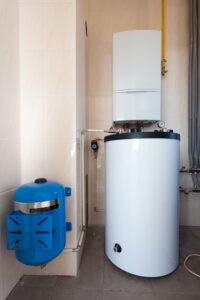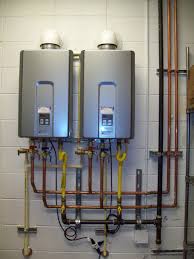All You Need to Know about Tank Water Heaters
All You Need to Know about Tank Water Heaters
Tank water heaters, also known as stand-alone, storage or conventional water heaters, are very much popular in many countries, especially in North America. If you own a condo or a house, you are most likely renting one of the 40 to 50 gallons of tank water heaters for a monthly fee. If your condo or house does not have a tank water heater, you can buy one.
Suppose you are currently planning to purchase a new water heater or would like to replace your existing tank water heater unit. In that case, it is highly recommended that you need to do some research to determine whether you would get a conventional tank water heater or a tankless water heater. You also need to be aware what size of the tank water heater you need if the 50-gallon tank size unit will suffice; how to correctly remove the old tank water heater unit; how to properly conduct maintenance measures on the tank water heater unit such as flushing, draining, and so on.
What You Need to Know About Tank Water Heaters
Below are the types of tank water heaters based on their fuel source:
Gas tank water heaters – utilize natural gas or propane (LP).
Electric tank water heaters – utilize electricity.
Solar tank water heaters – utilize solar energy.
Oil-fired tank water heaters – utilize oil.
Below is a list of the popular manufacturers/brands of HVAC equipment, including tank water heaters, commonly found in North America:
If you are looking for a tank water heater for your home or condo, your best bet would be a gas-powered tank water heater. You can also choose from other options such as oil-fired burners or electric water heaters. If you are one of those who support green technology and renewable energy, then solar tank water heaters can be a nice option for you as well.
As a matter of fact, it really does not matter which fuel type you would select. You only have to always keep in mind that tank water heater units have cylindrical tanks wherein the hot water is continuously kept hot inside as well as they need a special technical room such as a garage or closet.
Tank water heaters typically range from 20 to 100 gallons; the most popular is the 40, 50, 60, and 80-gallon tanks because they can produce enough hot water for a standard size of 4 to 6 family members. Smaller-sized tank water heaters can only be a few gallons such as the electric tank water heater Ariston from Bosch and are primarily meant for point-of-use applications.
When you are trying to replace a tank water heater unit, you need to use the nameplate that is found on the water heater to gather the necessary information, including the insulation R-value, the pressure rating of the tank, capacity, wattage, and voltage of the electric heating element or BTU for a gas tank water heater unit.
Take note that the yellow tag is the energy guide label that shows the annual costs of your tank water heater unit.
How a Tank Water Heater Works
Tank water heaters have a rather simple design. Their main cylindrical portion is a storage tank, where the hot water is stored and drawn when the bath, shower, dishwashing, or washing machine is turned on. In countries of North America, tank water heater units are typically standing on the floor in a vertical position.
A tank water heater works when cold water enters the bottom of the storage tank through the dip tube, and when after the cold water is heated by the electric heating elements or by the burner, the hot water then rises to the top of the tank. When you use hot water, it is replaced with cold water at the bottom by the dip tube.
A standard tank water heater unit is designed in a very simple manner so to make it easy to troubleshoot. Also, the access panel at the front of the tank water heater unit is conveniently positioned so to make it very easy to replace any faulty part if needed.
What You Should Know When Choosing Your Ideal Tank Water Heater Unit
Below are some things that you need to know in order to correctly choose a tank water heater unit that is ideal for you and your home:
Choose the right tank size; however, do not choose an oversized tank water heater because it will only lead to energy cost increases. If you have trouble deciding which tank size is right for your home, do not hesitate to ask a plumber or HVAC technician for professional advice.
High-efficiency tank water heaters are more expensive, but they are actually worth it in the long run as they are of a higher-quality rating, have efficient energy consumption, and have better warranties.
The hot water delivery capability or the First Hour delivery is a combination of a tank capacity and its recovery rate, or simply put, it refers to how much hot water it can produce in one hour.
The efficiency of an electric tank water heater unit is measured by its rating of watts loss or standby loss. The lower the standby loss, the better.
The efficiency of propane, gas, and oil-fired tank water heaters is actually measured by an energy factor (EF). The higher the energy factor, the better.
Tips on How to Save Money from Your Tank Water Heater
Below are some things you might need to know if you would like to save money while using your tank water heater:
If in case you have a conventional tank water heater, you will certainly save in the long run if you replace it with an energy-efficient tank water heater unit.
If it is possible that you can have it in your area, you can consider using a solar tank water heater.
How do you check if your tank water heater is wasting energy? Just put your hand on the tank’s outside surface. If it feels warm, your unit needs to have better insulation. The standby heat loss will be significantly reduced if you install the insulation blanket or jacket and this will save you some money (similar to energy-efficient units with thicker foam insulation). If you are going to buy a new tank water heater unit, select one with a higher insulation R-value.
There is actually a lot of heat and energy wasted if you wait for hot water to reach the tap. You will be able to significantly reduce energy loss if you insulate all of the pipes.
You are actually saving some money if you lower the temperature on the water heater thermostat by a few degrees. You will be reducing your fuel bill at about 1% when you lower the temperature on your thermostat by 1 degree for an 8-hour duration. The recommended temperature setting is between 120°F to 140°F.
In order to save money on your monthly bill, it is suggested that you buy a high-efficiency tank water heater unit because they can perform as much as 40% better than the conventional tank water heater units.
Take note that the average life expectancy of a tank water heater unit is about 13 years, and you can make it last much longer if you know how to properly take care of it.
This blog was posted by San Antonio’s Plumber
